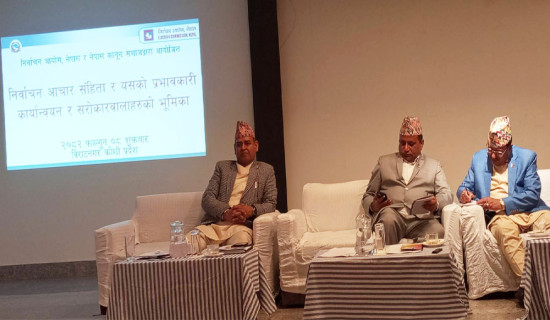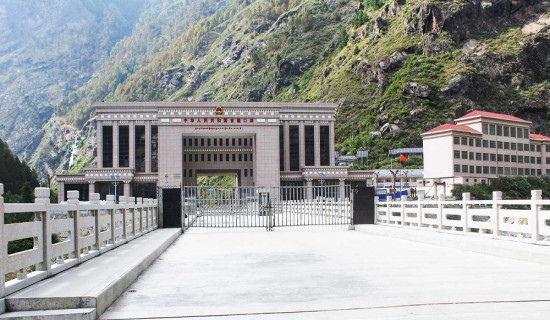- Saturday, 21 February 2026
The Evolving Ring Of Global Politics
International politics has moved beyond realism, rationalism and idealism debate and opened a new possibility for inter-paradigmatic cooperation across many scholarly constructs. The realist model of the maximisation of state security relative to other states or neo-realist domination of state conduct through the structure of the international system is shifting to a new order of multi-polarity. The transactional approach of the US is flagging international laws and institutions such as the UN and WTO by giving up multilateralism and weakening emancipatory critical theories of international relations. It has estranged its friends, competitors and foes. The scale of internal and external muddle became a powerful headwind for the US to cope.
It entails the US to adjust with other powers such as China, India, Russia, Brazil and South Africa rather than vainly push them back and claim global leadership with weak political will, resource limits and sub-optimal responsibilities. China has formulated its version of global order defined by a community of common destiny based on the Confucian ethics and principles of the UN, thus supporting its specialised agencies following the American retreat. In a cooperative model of this type, small nations can escape from the unfair conditionality of the hegemonic powers, their coercive spur for regime congruency and diversify their economies.
Turning point
The return of geopolitics has now brought global politics to the cusp of a turning point where the coexistence of sovereign nations entails a rule-based order and sharing of moral values and lawful interests. The hope of superpowers détente lies in the summit of APEC, where the American, Chinese and Russian presidents are likely to talk about settling global issues. American President Donald J. Trump might visit China to activate negotiations as the trade war is devoid of sequel. His special envoy Steve Witkoff visited Moscow to set off diplomacy but a peace deal has yet to be finalised as the deadline for the ceasefire in Ukraine collapsed.
Before the Trump and Putin summit on August 15 in Alaska, Europe is seeking security support from the US and the latter has reinforced land, air and sea defence systems in the Middle East and Europe. Ukrainian President Volodymyr Zelenskyy and Europe have rejected the American proposal of a land swap and want peace with dignity. Russia does not rule out peace but demands eastern Ukraine, no NATO membership and a halt to its rearming. Russia and China are supporting the aspirations of Asian, African and Latin American nations for self-determination from the domination of Atlantic-centered world politics.
BRICS nations summon international laws, norms and institutions. They are crucial to shape common expectations, reciprocity and civilised conduct in raising the scale of cooperation, help moderate the global system of anarchy, resolve security dilemmas and achieve stable peace. American replacement of democratic peace by peace through strength and unilateral imposition of tariffs on the entire world compelled the nations to look for alternatives to diversify their trade outside the US orbit, seek autonomy in defence and join new blocs. The transactional approach of the US no longer endears democratic affinity, while liberalism detests the intervention of one democratic state over others.
The US labelling of out-groups to all those who dislike its policy has alienated NATO, QUAD and Indo-Pacific defence partners. The US stance toward Canada, Mexico, Greenland and Gaza questions the realist approach of international politics based on Westphalian state sovereignty. Unable to find a middle way between isolation and global responsibilities, the imperial republic sees the erosion of the Western domination of non-Western societies and reacts nervously, devoid of the reliability of a deterrent. The stage of global politics now can be defined by the growth of new patterns:
Multi-polarity: China’s ascent is closing the gap in military, technology, diplomacy, economy, and AI with the US. It produces 80 per cent of the world’s tech lifelines — 17 rare earth minerals which are critical to manufacturing smartphones, fighter jets, EVs, radar, drones, semiconductors, etc. It pulled the plug on their export to the US and Europe, affecting their economic and technological progress. The EU-China cooperation on climate change stays positive. China’s trade surplus of $1.01 trillion surpasses the rest of the world.
In terms of purchasing power parity, the Chinese economy reached $33 trillion while that of the US is $26 trillion, though China claims itself a developing nation in terms of per capita income. The onset of Russia-India-China (RIC), the most powerful bloc in world politics in terms of population, military might, economy and technological innovation, has slighted the American and European threat of a tariff spat of 50 per cent if they do not cut off from Russian oil, gas and weapons but bolster Russian strategic capability.
It argues that Europe and America themselves buy Russian uranium, oil, gas and fertiliser. The US has reduced tariffs on Pakistan to 19 per cent and is engaging it in oil drilling. China has sharply criticised the US tariffs on India and Brazil, breaking the UN principles and liberal trade regime. Progress in Sino-Indian relations is evident from Indian Prime Minister Narendra Modi’s upcoming visit to China for the SCO meeting. It has declined to buy American F-35 fighters and entered into a defence deal with Russia to buy Sukhoi SU-57 fighter plane and S-500 air defence system. It can refuse to join America’s China containment strategy.
Comprehensive security: Global climate change and trade wars require a global solution. This applies to the control of nuclear proliferation as well. The nuclear sabre-rattling is evident when the USA has deployed two nuclear submarines close to Russian waters and the latter responded by deploying nuclear bombers near Alaska. The deadly escalation persists between the Russia-Ukraine wars. President Trump threatened Russia, saying, “We are prepared for nuclear war with Russia,” and coordinated with Europe to transfer arms to Ukraine. It puts the global public under the spell of horror and fear. Russia told President Trump, “Russia bows to no one,” sending a strong message of audacity.
Their shift from defensive to offensive realism has left the nuclear non-proliferation talk in the cold. Nuclear-owning powers flex their muscle as a geopolitical gamble and ignore the rule-based order. Israel is asking the US and EU to form a large military coalition to fight Yemen and secure international shipping and threatened to attack Turkey for its support to Syria, Iran and Pakistan. Chinese and Russian warships are engaged in a joint military drill in the Pacific Ocean and the Sea of Japan, showing strong defence ties. Fear of Russia, the EU sought to integrate Ukraine into its defence industries by shifting its policy from the logic of aid to the logic of integration.
France, the UK and Canada are recognising the state of Palestine and criticising Israel for its attack on Gaza. But the US and Israel oppose it and burden Palestine with extra economic sanctions. China has deployed ships in the Gulf of Oman and Russian air defence in Iran to protect it from American and Israeli attacks. The activation of the Nuclear Non-Proliferation Treaty and Strategic Arms Limitation Talks can save the world from the holocaust, divert resources to human security challenges—food, energy and nuclear safety and promote the wisdom of diplomacy for comprehensive security.
The emergence of the Global South: The emergence of BRICS has shifted the balance of power and redefined the rules and process of new development cooperation based on a win-win outcome. The Global South holds more leverage in international politics than the G7 and aspires to define its national priorities based on culture, civilisation and aspiration. China has flipped the American implosion of huge tariffs to African nations, reduced tariffs to zero on the entire African continent and replaced dollars with Yuan.
Russia, too, has deepened its strategic heft to Africa by signing a nuclear energy cooperation accord with Niger, a member of the Alliance of Sahel States. The stepping up of marginal nations of Asia, Africa and Latin America into the stage of global politics is likely to deconstruct the Atlantic-centric world politics based on hegemony, conditionality and regime congruency, undermining state sovereignty. A world of multi-polarity has linked citizens’ rights with the rights of humanity, hoping to calm the sordid facet of power politics.
New financial architecture: The BRICS created its own New Development Bank to support the priorities of member states and its own currency. It has ditched dollars. Even India accepted the Chinese Yuan. The Asian Infrastructure Investment Bank invests in connectivity, infrastructure, communication and livelihood projects. The European Central Bank prefers to use its own currency for trade instead of dollars. American banks are also switching to the Yuan for its stability, while the US is facing debt worth $ 38 trillion. De-dollarisation would reduce American control over the global financial system. Frustrated by the US, Canada and Mexico considering joining BRICS, while 10 big airlines pulled out their flights to the US, affecting the American tourism and service industries.
Cross-cultural global relations
Tariffs, border inspections and anti-immigration policies are attributed to this. Tourism is a great factor in international trust and cross-cultural global relations. The rise of BRICS and RIC sets a new context for Nepal to adapt its foreign policy true to its self-preservative goal rather than indulge in the caricature of neo-liberalism and its fantasy of modernity that only scaled down its metabolism. India may not team up with the US and Europe and bear their soft power influence in Nepal. The new geopolitical realignment of India and China is expected to assuage the former’s fear of China’s investments, making Nepal a manufacturing hub, trans-Himalayan links and even find scope to collaborate on shared interests.
Nepal has to rethink its policy of self-tormenting alienation from Russia for constructive engagement required of its nonalignment. A rational diplomacy requires Nepali leaders to adapt to the shifting constellation of powers in the world, in the neighbourhood and its geopolitical imperative, build institutional and leadership capacity of the nation to conquer an inferiority complex, mobilise labour, capital, brain and strategic leverage as multipliers of success to boost free spirit and sovereign identity.
(Former Reader at the Department of Political Science, TU, Dahal writes on political and social issues.)




-square-thumb.jpg)



-square-thumb.jpg)








